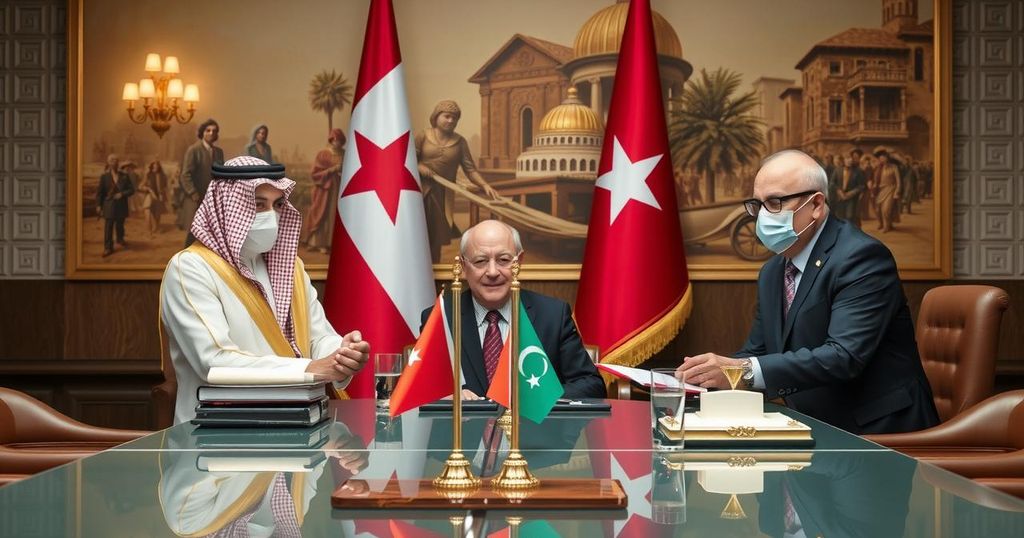Syria’s Foreign Minister, Asaad al-Shibani, has initiated diplomatic discussions with Qatar to re-establish relations after a decade of conflict. His visits to multiple countries aim to foster partnerships that would support Syria’s recovery from economic sanctions and promote stability under HTS governance. The ongoing humanitarian crisis in Syria intensifies the urgency of these diplomatic efforts, as 90% of the population reportedly lives in poverty.
Syria’s newly appointed Foreign Minister, Asaad al-Shibani, visited Qatar for discussions with Mohammed bin Abdulrahman Al Thani, Prime Minister and Foreign Minister of Qatar, in an effort to mend diplomatic relations with various nations. This visit follows al-Shibani’s engagement with the German and French Foreign Ministers in Damascus. The foreign minister is also planning trips to Jordan and the United Arab Emirates to foster strategic partnerships that would offer support for Syria’s security and economic rehabilitation, which remains critical following years of civil conflict.
The backdrop of these diplomatic efforts is the significant leadership change within Syria, following the ousting of President Bashar al-Assad by the insurgent group Hayat Tahrir al-Sham (HTS) on December 8. The devastating civil war that ensued from 2011 to the regime’s downfall took an immense toll on the Syrian populace, with estimates indicating that approximately 500,000 lives were lost. In response to the brutal repression of protests by Assad’s regime, many countries severed relations with Syria, imposing sanctions on Assad and his associates.
Now, under the de facto governance of HTS, Syrian authorities aim to re-establish international connections and potentially alleviate sanctions impacting Syria’s faltering economy. Qatar, historically opposed to Assad’s regime and supportive of opposition groups, has expressed concerns over the economic sanctions affecting the Syrian populace. Al-Shibani reiterated, “We conveyed to Doha our concerns about the challenges related to the economic sanctions imposed on the Syrian people and we renew our call on the United States to lift those sanctions,” demonstrating Syria’s urgency in addressing these economic challenges.
The current humanitarian crisis is dire, as the United Nations reports that around 90% of the Syrian population lives in poverty, with over half uncertain about their next meal. A national dialogue summit has been proposed by Ahmad al-Sharaa, who leads HTS, aiming to develop a new political framework, constitution, and facilitate elections in the country. This summit would also address the potential dissolution of HTS to unify different political factions during this transitional phase. Despite these efforts, there is skepticism about whether the United States and Europe will be willing to lift sanctions, given the concerns regarding human rights and the treatment of vulnerable groups within Syria.
The ongoing diplomatic endeavors by Syria’s new foreign minister emerge from a historical context marked by civil unrest and significant political upheaval. After more than a decade of conflict, the Syrian government has undergone a radical shift with the rise of HTS following the deposition of Bashar al-Assad’s government. The international community is wary of engaging with an HTS-led administration, particularly amidst concerns over human rights violations and the treatment of minorities. Syria’s previously established ties with regional powers have also been affected, complicating the landscape for any potential diplomatic re-engagement or economic recovery initiatives.
In summary, Asaad al-Shibani’s visit to Qatar symbolizes Syria’s urgent quest to restore diplomatic relations and alleviate the economic hardships exacerbated by international sanctions. This diplomatic overture, although laden with historical complexities, signifies a potential pivot for Syria under HTS rule, as it seeks regional support to stabilize its economy and governance structure. The future trajectory of Syria’s diplomatic engagement remains uncertain, especially concerning international responses to the existing sanctions and human rights concerns.
Original Source: www.euronews.com






